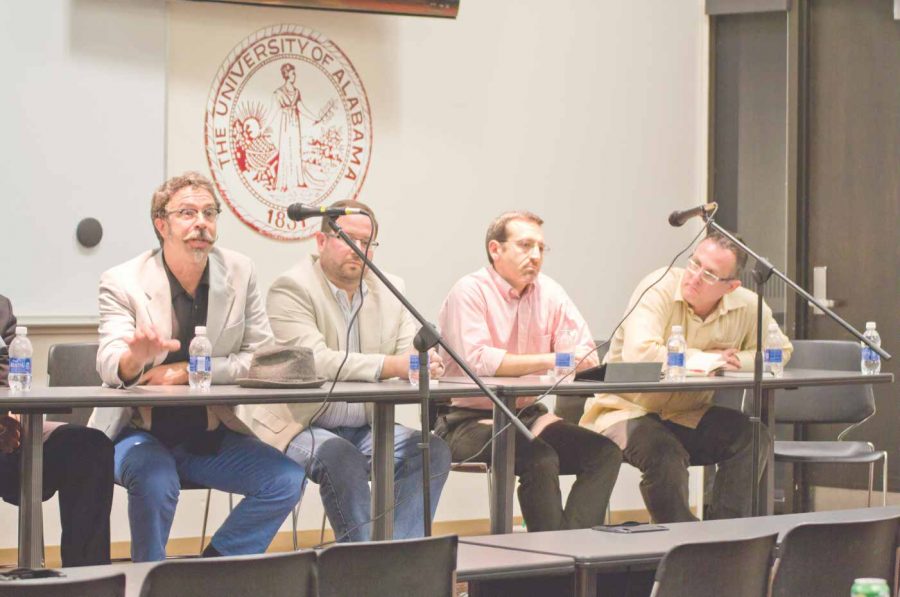In another example of the extent of involvement across the University of Alabama community in addressing the issues of racial discrimination in UA student organizations, WVUA-FM hosted a forum tasked with discussing potential solutions.
Seven members of the community, from a UA professor and biological anthropologist to the director of the Summersell Center for Study of the South, met at the Ferguson Center Tuesday night to discuss a framework for what might be done about racial inclusion on campus.
The forum, titled “Breaking the Gridlock,” began at 7:30 p.m. and was broadcast live on 90.7 The Capstone. Rich Robinson, news director for WVUA-FM, served as moderator, and each participant read opening statements at the start of the forum. State Rep. Chris England said in his remarks that discrimination is an extremely important issue that needs to be addressed as soon as possible, drawing parallels to other state issues.
“Like the recent immigration bill, it was almost like we weren’t talking about human beings – we were contributing to a conspiracy of silence. What we’re doing now, we aren’t starting a conversation about civil rights, but about human rights,” England said.
The discussion then took on a conversational tone, with each contributor taking time to address one another openly. Nathan James, a columnist for The Crimson White, opened the debate with the topic of negative publicity and said the media exposure forced the administration to act.
“They (the administration) stopped changing things as soon as it left the public realm, and I think that’s very telling,” James told the other participants.
Michael Innis-Jiminez, an American studies professor, said he was concerned the greek system would be left unchecked so long as it contributes to the football program. Steven Bunker, a history professor, pointed out that the greek system is not totally private, as it continues to receive money for house repairs. Money was repeatedly made a topic throughout the program.
“We need to come down to the issue and find out who is the dog and who is the cat,” Bunker said.
Both Bunker and England stressed the fact that these last few weeks have been some of the most groundbreaking in the University’s history. The panel members unanimously agreed that students should have a better outlet for voicing concerns about the administration and greek system, citing hazing allegations and the voting fraud scandal as examples.
“To say the administration is not beholden to the students is a bit of a cop-out. There’s a distinction between what we see students do and what we want them to do – bring the energy, the drive, the ideas – and what we hire administrators to do, which is to provide experience we trust they have…our role is to figure out how to change things, but we want you – the students, the community and the faculty, to tell us how we’re doing,” Christopher Lynn, a professor of biological anthropology, said.
The panel discussed what needs to be done to make things more transparent and inclusive between members of the school and students, stressing the need for communication.
“The relationship between greeks and the administration is very unique in that it creates a lot of legal accountability,” England said.
Invitations to speak were extended to representatives from all greek houses and the administration, but none were in attendance.
“Let’s protect and reinforce everybody who is a part of the university community. They need to stop saying they don’t have the authority to act on voter misconduct and segregation; that it’s up to students to make change or state officials to investigate. I call bull excrement on that. With the power of strong will comes a strong way,” Lynn said.
To view the event in its entirety, visit wvuafm.ua.edu.









